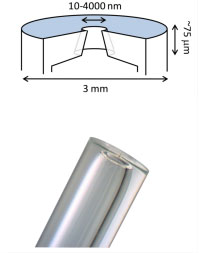
Nanopores
 Nanopores are very small holes made in an insulating material. Measurement of the electrical current through such apertures as they interact with various substances is the basis of our work at EBS.
Nanopores are very small holes made in an insulating material. Measurement of the electrical current through such apertures as they interact with various substances is the basis of our work at EBS.
Typically nanopores are produced in silicon, but its poor electrical properties present a problem in applications in which the current through the pore must be measured with low noise and high bandwidth. Examples include DNA sequencing, ion channel characterization, and chemical detection. The GNM, originally developed in the laboratory of our collaborator Professor Henry White at the University of Utah and licensed for use by EBS, provides a much better platform for such electrical measurements. The low capacitance and dielectric loss of the GNM, especially when made with quartz, enable measurements with exceptionally low noise.
To produce a GNM, a platinum wire is sharpened to a microscopically fine tip and then flame sealed into a capillary. The end of the capillary is sanded and then polished until a platinum disk of the desired diameter is exposed. The platinum is loosened by an etching solution, and then physically removed, leaving a nanometer scale aperture in the thin glass membrane.

